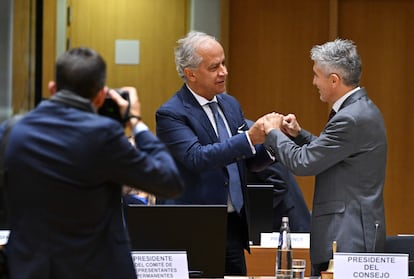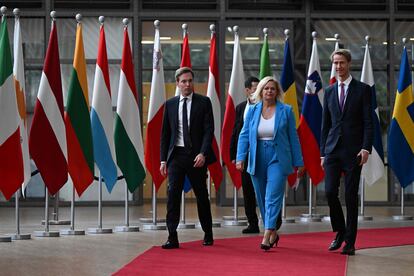Italy hinders compromise on the EU migration reform
Italian prime minister Giorgia Meloni tries to tighten European regulations on crisis situations to show her voters severity in the face of increasing irregular arrivals


Last-minute pressure has not been enough to reach a compromise on the long-awaited European migration pact. The reluctance of the Italian government, determined to appear tough on immigration, is slowing down the approval process by the European Union on the Crisis Regulation. This is the last leg of the long-awaited migration reform, which has been years in the making.
The latest draft of the pact seen by EL PAÍS, which would further restrict entry and asylum applications, received the green light from Germany on Thursday, at a meeting of European interior ministers. Berlin has managed to get a handful of claims on the rights of minors included, but Italy was not satisfied with what it considered a clear concession to Berlin, and so the negotiations continue.
“We are so convinced that we are going to have the agreement in a few days that I am almost pledging my word,” said Spanish Minister Fernando Grande-Marlaska at the end of the meeting with his counterparts in Brussels. “What remains is mostly fine-tuning.”
But Italy wants to make the text more flexible to establish that countries experiencing exceptional situations will not have to comply with EU asylum rules. Rome demands, among other things, that the act of NGOs carrying out humanitarian aid operations, especially rescues at sea, fall under the umbrella concept of “instrumentalization” — using irregular migration to destabilize a member state.
But the current text stresses that “instrumentalization” can only be considered when there is a real intention to destabilize the member state through irregular immigration, as happened in the migration crisis of 2021, when Aleksandr Lukashenko’s Belarusian regime sent thousands of migrants over its border with countries on the EU eastern frontier — Lithuania, Latvia, and Poland — in order to punish the EU for imposing sanctions on his country.
According to the latest draft from September 27, the Crisis Regulation could further restrict the acceptance of asylum applications, extend the period of processing for asylum seekers, and also allow for the detention period for asylum seekers to be lengthened, making it eight weeks longer than the 18 months allowed under normal conditions. Human rights and immigration NGOs have warned that this new Crisis Regulation may create a gray area in which the rights of migrants are violated.
The text was not even on the agenda for September 28, but the images of Lampedusa, the Italian island saturated with migrants arriving in extremely precarious conditions, along with the pressures of the European Parliament, pushed the EU to try to reach an agreement. The 27 member states do not want to arrive at the European elections in June 2024 with the divisive migration debate still on the table.
“We will assume our responsibilities and this compromise brilliantly negotiated by Spain,” said the German interior minister, Nancy Faeser, at the meeting. Berlin has been one of the most reticent with regard to the form this new Crisis Regulation should take but has fought to limit the scope of exceptions that Italy is so in favor of. The struggle between the two countries has prompted the Italian prime minister, the ultra-conservative Giorgia Meloni, to write to the German chancellor, the Social Democrat Olaf Scholz, demanding explanations regarding German state aid to NGOs rescuing migrants in the Mediterranean.

Despite the friction between Germany and Italy, the head of the European Commission’s Interior, Ylva Johansson, said that “there are no major obstacles” to reaching an agreement and insisted that there will be a formal decision in the next few days.
Other EU sources point out that the problems with Italy are no longer in the drafting of the text but come from Meloni’s own government, which is made up of two far-right parties — the League led by Matteo Salvini and the Prime Minister’s Brothers of Italy — neither of which can be seen to relent.
Priority for minors and special needs
The text debated this Thursday establishes that the authorities of the member states will have up to 20 weeks to examine asylum applications at its borders, and it stipulates that minors and people with special needs will have priority, a detail Germany tried to include in the previous regulations.
If the pact is not concluded by the end of the year, it will prove complicated: the first semester of 2024 with Belgium at the EU Council’s helm is shorter because of the European elections in June; then it will be the turn of Poland and Hungary — two member states that veto any common migration policy and which have been committed to trying to block the pact, even stating that they will not comply with it if it goes ahead.
EU member states received around 520,000 asylum applications in the first half of 2023, according to European data. Among the factors straining relations between member states include the increase in migrant arrivals, which has accelerated after the pandemic, and tensions between frontline countries such as Italy, Spain, or Greece and those receiving migrants subsequently, such as Germany, the Netherlands, or France. Last Tuesday, Germany announced that it will impose temporary controls on its borders with Poland and the Czech Republic to curb irregular immigration. Italy has demanded more help from the European Commission to deal with the increase in arrivals via the central Mediterranean route, and France has toughened its stance on the whole issue.
According to EU sources, these tensions are forcing member states to try to come to a quick agreement on the migration pact and also to explore new agreements with countries of origin and transit, such as the controversial deal signed with Tunisia with financial assistance from Brussels, including funds for border management, in exchange for the curbing of migratory flows.
“We are on the verge of reaching the agreement that the EU needs after many years of attempts and failures,” said European Commission Vice-President Margaritis Schinas, in charge of European Way of Life, which encompasses immigration. Schinas has spoken of “progress” with the pact. “We need to deprive the demagogues and the populists of the argument that Europe cannot sort out our immigration problem,” she said.
Sign up for our weekly newsletter to get more English-language news coverage from EL PAÍS USA Edition
Tu suscripción se está usando en otro dispositivo
¿Quieres añadir otro usuario a tu suscripción?
Si continúas leyendo en este dispositivo, no se podrá leer en el otro.
FlechaTu suscripción se está usando en otro dispositivo y solo puedes acceder a EL PAÍS desde un dispositivo a la vez.
Si quieres compartir tu cuenta, cambia tu suscripción a la modalidad Premium, así podrás añadir otro usuario. Cada uno accederá con su propia cuenta de email, lo que os permitirá personalizar vuestra experiencia en EL PAÍS.
¿Tienes una suscripción de empresa? Accede aquí para contratar más cuentas.
En el caso de no saber quién está usando tu cuenta, te recomendamos cambiar tu contraseña aquí.
Si decides continuar compartiendo tu cuenta, este mensaje se mostrará en tu dispositivo y en el de la otra persona que está usando tu cuenta de forma indefinida, afectando a tu experiencia de lectura. Puedes consultar aquí los términos y condiciones de la suscripción digital.








































